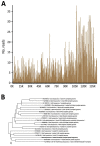Human Endophthalmitis Caused By Pseudorabies Virus Infection, China, 2017
- PMID: 29774834
- PMCID: PMC6004832
- DOI: 10.3201/eid2406.171612
Human Endophthalmitis Caused By Pseudorabies Virus Infection, China, 2017
Abstract
We report human endophthalmitis caused by pseudorabies virus infection after exposure to sewage on a hog farm in China. High-throughput sequencing and real-time PCR of vitreous humor showed pseudorabies virus sequences. This case showed that pseudorabies virus might infect humans after direct contact with contaminants.
Keywords: Alphaherpesvirinae; China; Herpesviridae; Human endophthalmitis; Jiangxi Province; Suid herpesvirus 1; endophthalmitis; high-throughput nucleotide sequencing; hog farm; pseudorabies; swineherder; viruses.
Figures


References
Publication types
MeSH terms
Substances
LinkOut - more resources
Full Text Sources
Other Literature Sources
Medical

